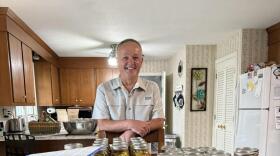For decades, the Amoskeag Manufacturing Company dominated Manchester and most facets of life in the city. It laid the foundations for how the Queen City would eventually zone its neighborhoods.
One neighborhood living with the effects of that zoning is Manchester’s East Side. As part of the Granite State News Collaborative’s new series Invisible Walls, NHPR’s Gaby Lozada talked with two business owners there about the challenges they face every day, and what they’re doing about it.
Watch the video below to hear from two business owners:
Video Transcript
Every day Carlos Colón rolls up the door of his auto repair shop on Union Street in Manchester. It smells like oil and gasoline but the tools are impeccable.
He started working here at fifteen. Now he owns the place.
Colón grew up here. People know him, and he knows everything about his neighborhood.
“It’s not a bad neighborhood, there are other bad places here, but it's not a good neighborhood either,” he says.
Around his shop, you can see kids holding hands, walking down the street after school, and people coming and going from the bodegas and barbershops.
It’s a lively neighborhood but there are people who need help. Colón does what he can.
"I help people with gas, helping people to fix their cars and stuff like that," he says. "You know, not a lot of people in this neighborhood have a lot of money, you know, especially with the rent the way it is nowadays."
Some blocks away on Maple Street, is Ana Food Market.
"Mira que bonita se frie la empanada," says Ana Román, the owner, as she pulls out a perfectly golden empanada from the fryer.
She sells everything from spices to clothing and prepares homemade Spanish food, like fried plantains and chicharrones,
Sometimes she shares those dishes free of charge when neighbors and immigrants need a warm meal.
"Los imigrantes vienen a que los ayude, unos no tienen para comer y yo se lo doy gratis," she says.
Román has lived here for 25 years. She started out with a food truck called Sabroso but saved enough to open the store two years ago.
"Aquí es que he hecho mi vida, aquí es donde he podido progresar," she says.
She says she’s made strides in this neighborhood, but it hasn't been easy.
"Fue dificil comenzar, los inspectores nos hicieron la vida imposible," she says.
The bank denied her a loan and she feels inspectors have discriminated against her for being Latina. In this neighborhood, about a third of residents are Hispanic.
Many of the effects of Manchester’s exclusionary zoning practices play out here: denser housing, concentrated poverty, and fewer services.
In the past few years, she’s noticed other ways the neighborhood has changed.
She says, before, she could work until 11 p.m., but now she has to close earlier. She is afraid of being mugged inside the market.
Colón, the mechanic, says some of the problems of the neighborhood are drugs and homelessness. The only overnight emergency shelter in all the city and around twenty addiction support services as clinics or AA meeting places are located on the East Side.
"There are probably like four [methadone clinics] in this area, and all they're doing is attracting more people to come over here to this neighborhood," he says. "You know, you've got all these people from the shelter; the shelter doesn´t help them either. So they sleep everywhere, they pee everywhere.
Like, I understand that people got a disease, but where do you draw the line?"
Colón is bothered that there aren’t as many rehabilitation centers in other neighborhoods; he says that’s one of the things that has given the East Side such a bad reputation.
"And then who pays for that? Spanish people. 'Oh, yeah, that's a Spanish neighborhood.' And most of the time, they're not even Spanish people that are causing the problems," he says.
And it’s not only the drugs; around Colón’s shop, you can see overflowing garbage cans left out for days.
Colón collects facemasks to needles off the street every day. He thinks the city neglects this neighborhood and ignores its problem landlords.
A 2021 NHPR report discovered about half of all housing complaints to the city’s enforcement department come from low and moderate-income neighborhoods, like the East Side.
"You know, sometimes you try to clean up the neighborhood, but you know you got landlords like this," Colón says. "They own these big, big buildings. They live in Massachusetts, and they don't take care of the neighborhood."
People want to see a change. These two business owners, Román and Colón say it’s time to make their voices heard and fight this kind of treatment and discrimination from the city and the banks.
They want to form the first committee of East Side business owners.
But Román says there isn't a lot of unity yet among business owners, and Colón adds that the other problem is that their neighbors think the people in charge aren’t listening.
"I hear from a lot of people, especially Spanish people they don’t help out is because they don’t get to hear their voices and stuff like that," he says.
Now, there’s now an effort to meet at least once a month, which Colón says could make a significant change. He says everyone needs to work together to make the neighborhood better and break stereotypes.
"I defend his neighborhood a lot. All I know is this neighborhood. It's got great food, Spanish food and stuff like that," he says. "I think it's a cool neighborhood. You know, there is a little world in this neighborhood."
Colón and Román want to make sure that little world is taken care of.









